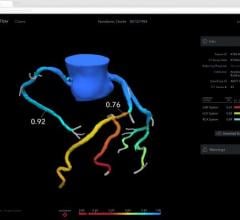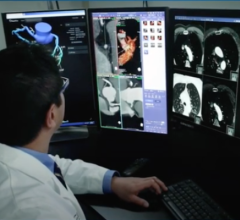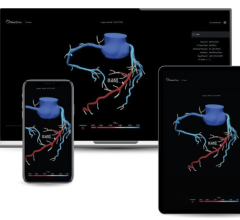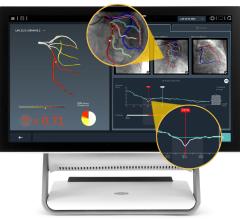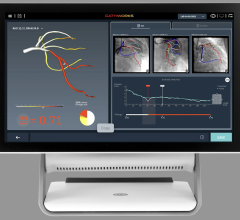
72-year-old with intermediate (50-70%) stenosis in distal right coronary artery, who underwent coronary CTA due to atypical chest pain. (A) 3D volumetric rendering of coronary arteries, and (B) multiplanar reconstruction, show distal right coronary artery lesion (dashed box). (C) Image from onsite deep learning-based FFR-CT algorithm shows corresponding lesion (arrow). FFR-CT was 0.87. (D) Image from subsequent invasive coronary angiography shows corresponding lesion (arrow). Invasive FFR was 0.85, consistent with absence of hemodynamically significant stenosis.
May 5, 2023 — According to an accepted manuscript published in ARRS’ own American Journal of Roentgenology (AJR), a high-speed onsite deep-learning based fractional flow reserve (FFR)-CT algorithm yielded excellent diagnostic performance for the presence of hemodynamically significant stenosis, with both high interobserver and intraobserver reproducibility.
“A rapid and accurate onsite approach for determining FFR-CT should address challenges encountered in the clinical adoption of prior FFR-CT implementations,” wrote corresponding author Ronny Ralf Buechel, MD, from University Hospital Zurich in Switzerland.
In this AJR accepted manuscript, 59 patients (46 men, 13 women; mean age 66.5 years) underwent coronary CTA (including calcium scoring) followed within 90 days by invasive angiography with invasive FFR and/or instantaneous wave-free ratio (iwFR) measurements from December 2014 to October 2021. Coronary artery lesions were considered to show hemodynamically significant stenosis in the presence of invasive FFR ≤0.80 and/or iwFR ≤0.89. A single cardiologist evaluated CTA images using an onsite deep-learning based semiautomated algorithm employing a 3D computational flow dynamics model to determine FFR-CT for coronary artery lesions detected by invasive angiography. Then, time for FFR-CT analysis was recorded. FFR-CT analysis was repeated by the same cardiologist in 26 randomly selected examinations, as well as by a different cardiologist in 45 randomly selected examinations.
Ultimately, Buechel et al.’s onsite deep-learning based FFR-CT algorithm evidenced AUC for hemodynamically significant stenosis—based on invasive angiography—of 0.975, sensitivity of 93.5%, and specificity of 97.7%. Among severely calcified lesions, their same algorithm had AUC of 0.991, sensitivity of 94.7%, and specificity of 95.0%. Moreover, the mean analysis time was 7 minutes and 54 seconds.
“To our knowledge,” the authors of this AJR accepted manuscript added, “the currently reported mean processing timer represents the fastest reported time for onsite FFR-CT analysis.”
For more information: www.arrs.org


 February 03, 2026
February 03, 2026 

